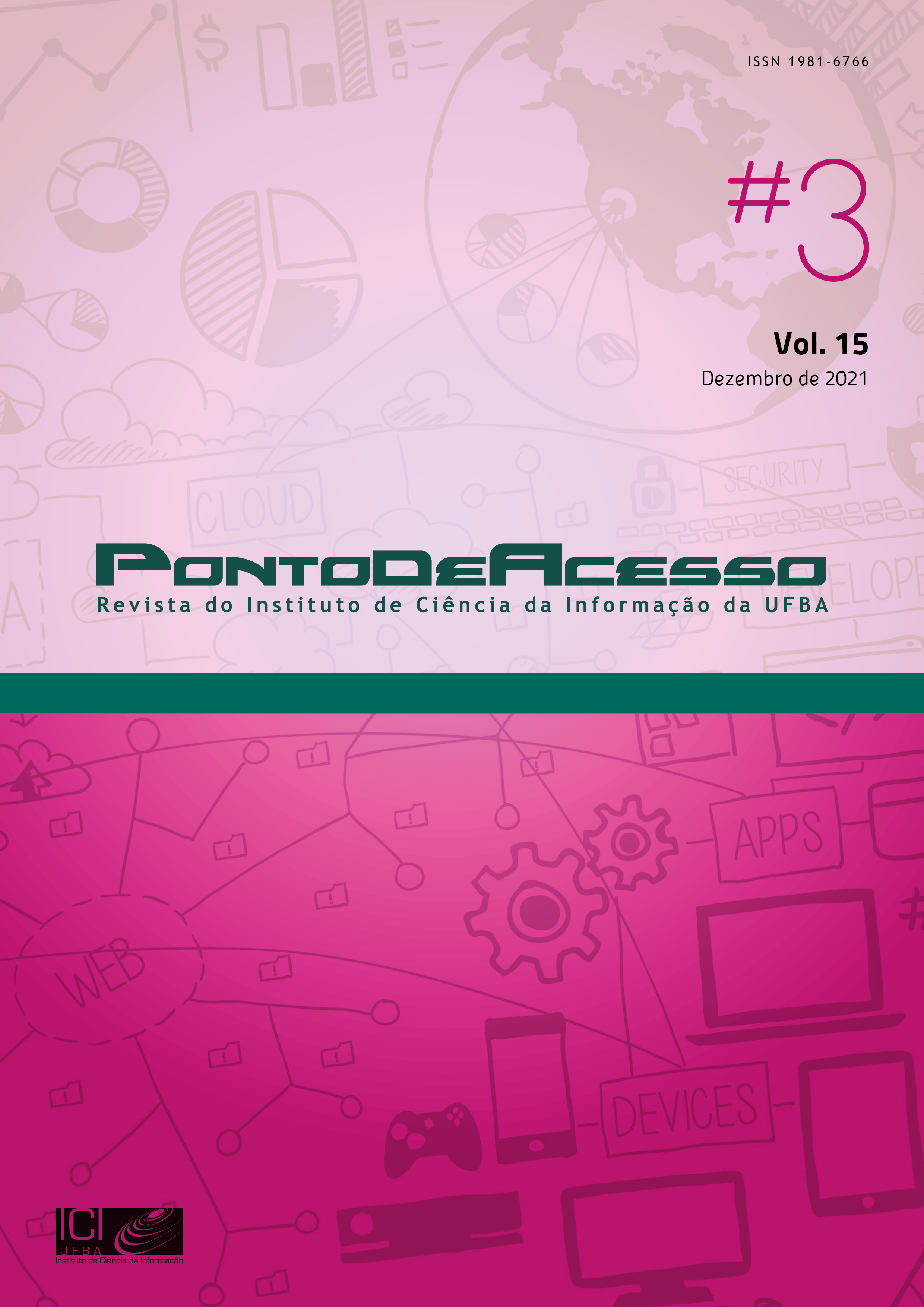THE IMPORTANCE OF CONTEXT FOR INDEXING
DOI:
https://doi.org/10.9771/rpa.v15i3.47469Keywords:
Indexing, Subject analysis, Context, Organization of information and knowledgeAbstract
Indexing is an important process in an Information Retrieval System (SRI) consisting of two stages: subject analysis and translation. It is known that the literature points to the subject analysis stage as one of the most difficult processes to be carried out, due to its subjective nature. An important factor to note in this process is context. The aim of this study, more specifically, is to analyze the different points of view that the importance of context has in the indexing process, specifically the socio-cognitive context. This research is part of a bibliographical survey characterized as exploratory and descriptive. It is concluded that all approaches presented in the literature assume that the indexing process always suffers sociocultural influence, and depend on the specific cultural and social context of the indexer and the user.
Downloads
References
ALBRETCHTSEN, H. Subject analysis and indexing: from automated indexing to domain analysis. The Indexer, London, v. 18, n. 4, p. 219-224, Oct. 1993.
ALMEIDA, C. C. DE, FUJITA, M. S. L., REIS, D. M. dos. Peircean semiotics and subject indexing: contributions of speculative grammar and pure logic. Knowledge Organization, 2013.
AUSTIN, D. PRECIS: a manual of concept analysis and subject indexing. London: Council of the British National Bibliography, 1974.
BARROS, L. A. Curso básico de terminologia. São Paulo: Editora da Universidade de São Paulo, 2004.
BEGHTOL, C. Bibliographic classification theory and text linguistics: aboutness analysis, interxtuality and the cognitive act of classifying documents. Journal of Documentation, London, v. 42, n. 2, p. 84-113, 1986.
BERTRAND, A.; CELLIER, J. M. Psychological approach to indexing: effects of the operator’s expertise upon indexing behavior. Journal of Information Science, v. 21, n. 6, p. 459-472, 1995.
BORKO, H. Toward a theory of indexing. Information Processing & Management, v. 13, p. 335-365, 1977.
CESARINO, M. A. N. Sistemas de recuperação da informação. Revista da Escola de Biblioteconomia da UFMG, Belo Horizonte, v. 14, n. 2, p. 157-168, set. 1985.
COOPER, W. S. Indexing documents by Gedanken experimentation. Journal of the American Society for Information Science, New Jersey, p. 107-119, May, 1978.
DAL´EVEDOVE, P. R. O tratamento temático da informação em abordagem sociocultural: diretrizes de política de indexação em bibliotecas universitárias. 2014. Tese (Doutorado em Ciência da Informação) – Faculdade de Filosofia e Ciências, Universidade Estadual Paulista, Marília, 2014.
DAL´EVEDOVE, P. R.; FUJITA, M. S. L. Estudo sociocultural da comunidade discursiva do tratamento temático da informação em bibliotecas universitárias. Encontros Bibli, v. 18, n. 36, p. 23-50, jan./abr., 2013.
DAHLBERG, I. Teoria do conceito. Ciência da Informação, Rio de Janeiro, v. 7, n. 2, p. 101-107, 1978. Disponível em: http://revista.ibict.br/ciinf/article/view/115/115. Acesso em: 10 abr. 2016.
DAVID, C. et al. Indexing as problem solving: a cognitive approach to consistency. In: KINNEY, T. (ed.). Forging New Partnerships in Information: Converging Technologies: Proceedings of the 58th Asis Annual Meeting 32. Medford, NJ: Information Today for the American Society for Information Science, 1995. P. 49-55. Apud HJØRLAND, 2018.
FARRADANE, J. E. L. Relational Indexing: Introduction and Indexing (also with the title: String indexing: relational indexing: introduction and indexing). London, Ontario: University of Western Ontario, School of Library and Information Science, 1977. Apud HJØRLAND, 2018.
FARROW, J. D. A cognitive process model of document indexing. Journal of Documentation, London, v. 47, p. 149-166, 1991. Apud HJØRLAND, 2018.
FIDEL, R. User-centered indexing. Journal of the American Society for Information Science, New Jersey, v. 45, n. 8, p. 572-576, 1994.
FROHMANN, B. Rules of indexing: a critique of mentalism in information retrieval theory. Journal of Documentation, London, v. 46, n. 2, p. 81-101, 1990.
FUGMANN, R. The five-axiom theory of indexing and information supply. Journal of the American Society for Information Science, New Jersey, v. 36, n. 2, p. 116-129,1985. Apud HJØRLAND, 2018
FUGMANN, R. Subject analysis and indexing: theoretical foundations and practical advice. Frankfurt: Index Verlag, 1993.
FUGMANN, R. Toward a theory of information supply and indexing. International Classification, v. 6, n. 1, p. 3-15, 1979.
FUJITA, M. S. L. A importância teórica e prática da indexação na fundamentação científica da organização e representação do conhecimento. In: DODEBEI, V.; GUIMARÃES, J. A. C. (org.). Complexidade e organização do conhecimento: desafios de nosso século. 1. ed. Marília: Sociedade Brasileira de Organização do Conhecimento – ISKO Brasil; Fundepe Publicações, 2013. v. 1, p. 147-159.
FUJITA, M. S. L. A leitura documentária do indexador: aspectos cognitivos e linguísticos influentes na formação do leitor profissional. 2003. Tese (Livre-Docência em Análise Documentária e Linguagens Documentárias Alfabéticas) – Faculdade de Filosofia e Ciências, Universidade Estadual Paulista, Marília, 2003.
FUJITA, M. S. L. A leitura documentária na perspectiva de suas variáveis: leitor-texto-contexto. DataGramaZero – Revista de Ciência da Informação, Rio de Janeiro, v. 5, n. 4, ago. 2004.
FUJITA, M.S.L.; RUBI, M. P. Modelo de lectura profesional para la indización. Scire, Zaragoza, v. 12, p. 47-69, 2006.
GIASSON, J. A compreensão na leitura. Lisboa: Asa, 1993.
HJØRLAND, B. Epistemology and the socio-cognitive perspective in information science. Journal of the American Society for Information Science and Technology, v. 53, n. 4, p. 257-70, 2002.
HJØRLAND, B. Indexing: concepts and theory. In: HJØRLAND, B. (ed.). ISKO Encyclopedia of knowledge organization. [S. l: s. n.], 2018. Disponível em: https://www.isko.org/cyclo/
HJØRLAND, B. Information seeking and subject representation: an activity-theoretical approach to information science. Westport: Greenwood Press, 1997.
HJØRLAND, B. Subject (of Documents). Knowledge Organization, [s. l.], v. 44, n. 1, p. 55-64, 2017.
HJØRLAND, B.; ALBRECHTSEN, H. Toward a new horizon in information science: Domain analysis. Journal of the American Society for Information Science, New Jersey, v. 46, n. 6, p. 400-425, 1995.
HOUGHTON, B.; CONVEY, J. On-line information retrieval systems: an introductory manual to principles and pratice. London: Clive Bingley, 1977.
INTERNATIONAL STANDARD ORGANIZATION. ISO 5963. Documentation. methods for examining documents, determining their subjects, and selecting indexing terms. Genève: International Organization for Standardization, 1985. Apud HJØRLAND, 2018.
JONES, K. P. Towards a theory of indexing. Journal of Documentation, London, v. 32, n. 2, p. 118-123, 1976.
KOCH, I. G. V. Desvendando os segredos do texto. São Paulo: Cortez, 2002.
LANCASTER, F. W. Indexação e resumos: teoria e prática. Brasília: Briquet de Lemos/Livros, 1993.
LANCASTER, F. W. Indexing and abstracting in theory and practice. 3. ed. London: Facet Publishing, 2003. Apud HJØRLAND, 2018.
MAI, J-E. The role of domains, documents, and decisions in indexing. Advances in Knowledge Organization, [Germany], v. 9, p. 207-213, 2004. Trabalho apresentado na 8ª International ISKO Conference, 2004, London.
MAI, J-E. Semiotics and indexing: an analysis of the subject indexing process. Journal of Documentation, London, v. 57, n. 5, p. 591-622, 2001.
NAVES, M. M. L. Análise de assunto: concepções. Revista de Biblioteconomia de Brasília, Brasília, v. 20, n. 2, p. 215-226, jul./dez.1996.
NAVES, M. M. L. Fatores interferentes no processo de análise de assunto: estudo de caso de indexadores. 2000. Tese (Doutorado em Ciência da Informação) – Escola de Ciência da Informação, Universidade Federal de Minas Gerais, Belo Horizonte, 2000.
NEVES, D. A. de B. Aspectos metacognitivos na leitura do indexador. 2004. Tese (Doutorado em ciência da informação) Escola de ciência da informação, Universidade Federal de Minas Gerais, Belo Horizonte, 2004.
OLSON, Hope A. The power to name: locating the limits of subject representation in libraries. Dordrecht, The Netherlands: Kluwer Academic Publishers, 2002. Apud HJØRLAND, 2018
PINTO MOLINA, M. El resumen documental: princípios y métodos. Madrid: Fundación Germán Sánchez Ruipérez: Pirámide, 1992.
RANGANATHAN, S. R. Theory of library catalogue. Madras; London: The Madras Library Association; E. Goldston, 1938. Apud HJØRLAND, 2018.
SHERA, J. H. Classification as the basis of bibliographic organization. In: SHERA, J. H.; EGAN, M. E. (ed.). Bibliographic Organization: Papers presented before the Fifteenth Annual Conference of the Graduate Library School July 24-29, 1950. Chicago: University of Chicago Press, 1951. p. 72-93. Apud HJØRLAND, 2018.
SMIT, J. W. Análise documentária: a análise da síntese. 2. ed. Brasília, DF: IBICT, 1989.
SOERGEL, D. Organizing information: principles of database and retrieval systems. Orlando: Academic Press, 1985.
VAN DIJK, T. A. Relevance assignment in discourse comprehension. Discourse Processes, v. 2, p. 113-26, 1979.
WEINBERG, B. H. Indexing: history and theory. In: MCDONALD, J. D.; LEVINE-CLARK, M. Encyclopedia of Library and Information Sciences. 4th ed. Boca Raton, FL: CRC Press, 1978-1991. Apud HJØRLAND, 2018.
WILSON, P. Two kinds of power: an essay on bibliographical control. Berkeley: University of California Press,1968. Apud HJØRLAND, 2018.
Downloads
Published
How to Cite
Issue
Section
License
Copyright (c) 2021 PontodeAcesso

This work is licensed under a Creative Commons Attribution 4.0 International License.
A PontodeAcesso utiliza a licença do Creative Commons (CC), preservando assim, a integridade dos artigos em ambiente de acesso aberto. A revista permite que o autor retenha os direitos de publicação sem restrições.








